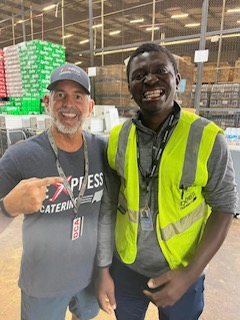 When business owner Frank Fumich started making a sustained effort to hire refugees and other immigrants, the positive impact on his workforce, his business, and his life was felt immediately.
When business owner Frank Fumich started making a sustained effort to hire refugees and other immigrants, the positive impact on his workforce, his business, and his life was felt immediately.
As owner of airline catering service Express Catering and as a Global Refuge Preferred Refugee Employer, Fumich employs a large number of refugee and immigrant workers. In fact, nearly his entire workforce at Express Catering’s Ronald Reagan Washington National Airport location is made up of immigrants.
So when he learned that some refugees with legal work authorization would soon lose their status and face deportation, Fumich knew it would hit close to home.
“I just lost two of my hardest working employees from Nicaragua who had been granted humanitarian parole,” says Fumich, referring to the Humanitarian Parole Program for Cubans, Haitians, Nicaraguans, and Venezuelans (CHNV), which allowed citizens of these countries legal entry into the United States for a period of up to two years if a person in the U.S. agreed to support them. The CHNV program was terminated on January 20, 2025 through an executive order.
“These guys worked for me for two years and were great workers. We were all so sad to see them leave.”

Working closely with immigrants and refugees has given Fumich a unique perspective on the challenges New Americans face, both in the workplace and in their personal lives.
When one of his employees shared the heartbreaking story of being separated from his wife and daughter, who were still in Cameroon, for five years, Fumich immediately offered his support.
“As a husband and father, I can’t imagine being apart from my family for that long,” he says. “I wanted to help him and knew he couldn’t afford a lawyer on his own, so I offered to find one.” Thanks to Fumich’s support and persistence, the employee and his family were reunited in the U.S. three years later.
This dedication to his employees’ well-being led Fumich to become a Global Refuge Preferred Refugee Employer (PRE). To qualify as a PRE, a company must meet at least five of Global Refuge’s refugee employment best practices, including:
- Free transportation or assistance in purchasing a vehicle
- Refugee-specific new hire orientation sessions
- Pathways for promotion and record of advancing refugee employees
- Annual goal for refugee hires
- Housing assistance and/or childcare subsidies
PREs receive ongoing training and support from Global Refuge and become proven pipelines for hiring and retaining refugee talent.
“Usually, hiring someone is a completely blind process,” Fumich says. “I like that Global Refuge can match an employee’s skills with what I’m looking for.”
Fumich believes there’s a need for greater awareness that many refugee and other immigrant employees are legally authorized to work—and they pay taxes just like any other employee.
“Immigrants are incredibly important to our country and our economy,” he says. “We need common sense immigration laws that recognize that. It’s that simple.”
Interested in becoming a Preferred Refugee Employer? Learn more and sign up on our website!

 When business owner Frank Fumich started making a sustained effort to hire refugees and other immigrants, the positive impact on his workforce, his business, and his life was felt immediately.
When business owner Frank Fumich started making a sustained effort to hire refugees and other immigrants, the positive impact on his workforce, his business, and his life was felt immediately.